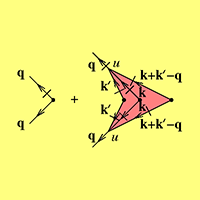Abstract
The universal critical behavior of the driven-dissipative nonequilibrium Bose-Einstein condensation transition is investigated employing the field-theoretical renormalization group method. Such criticality may be realized in broad ranges of driven open systems on the interface of quantum optics and many-body physics, from exciton-polariton condensates to cold atomic gases. The starting point is a noisy and dissipative Gross-Pitaevski equation corresponding to a complex-valued Landau-Ginzburg functional, which captures the near critical nonequilibrium dynamics, and generalizes model A for classical relaxational dynamics with nonconserved order parameter. We confirm and further develop the physical picture previously established by means of a functional renormalization group study of this system. Complementing this earlier numerical analysis, we analytically compute the static and dynamical critical exponents at the condensation transition to lowest nontrivial order in the dimensional expansion about the upper critical dimension and establish the emergence of a novel universal scaling exponent associated with the nonequilibrium drive. We also discuss the corresponding situation for a conserved order parameter field, i.e., (sub)diffusive model B with complex coefficients.
- Received 18 December 2013
DOI:https://doi.org/10.1103/PhysRevX.4.021010
This article is available under the terms of the Creative Commons Attribution 3.0 License. Further distribution of this work must maintain attribution to the author(s) and the published article’s title, journal citation, and DOI.
Published by the American Physical Society
Popular Summary
Water turns into ice below 0°C at ambient pressure. A quantum fluid of exciton polaritons, driven by laser light, condenses into a state with macroscopic phase coherence, as observed recently. Both of these changes are called “phase transitions,” but there is a fundamental difference: The first case represents an equilibrium transition, with zero net exchanges of energy or material with the system’s environment. In the second case, in contrast, the system is driven, experiencing a throughput of energy and matter enabled by the action of the laser light.
Nonequilibrium phase transitions are much more difficult to describe and understand, in general. The physics of quantum nonequilibrium phase transitions in many-body systems is still in its infancy, in particular, but has been brought to the forefront of physics research by the spectacular achievements in recent years in generation, control, and manipulations of light-matter interactions in a diverse range of quantum systems, from ultracold atom gases in optical lattices and exciton-polaritons in semiconductors to quantum spin systems of trapped ions. A fundamental theoretical framework for understanding and characterizing such nonequilibrium phase transitions is, therefore, urgently needed. In this theoretical paper, we contribute a significant piece to that much-needed framework.
The context in which we make our contribution is a paradigmatic one: the dynamics associated with a critical phase transition in a system of bosons under light driving and with dissipation. In this model system, neither the energy nor the particle number is conserved, a situation typical of strong light-matter interactions. It is known that there is a critical nonequilibrium phase transition where the bosons “condense” into a state of quantum coherence. But, knowledge about the dynamic properties close to the transition is very limited so far. Utilizing the field-theoretic perturbational renormalization group technique, we obtain a number of analytical results. Notably, we find that the system ultimately thermalizes effectively and can therefore be described by a well-known model of equilibrium dynamical phase transitions, which is, however, very different from the direct equilibrium counterpart of boson condensation. However, there emerges a novel subleading universal critical behavior that describes the loss of quantum coherence and has no immediate classical or equilibrium analog.
Analytical results on nonequilibrium quantum phase transitions are rare. Our approach and results are part of the theoretical work that forms the foundation of, and sets the direction for, further development in this timely topical area, where the disciplines of quantum optics and many-body physics increasingly merge.



